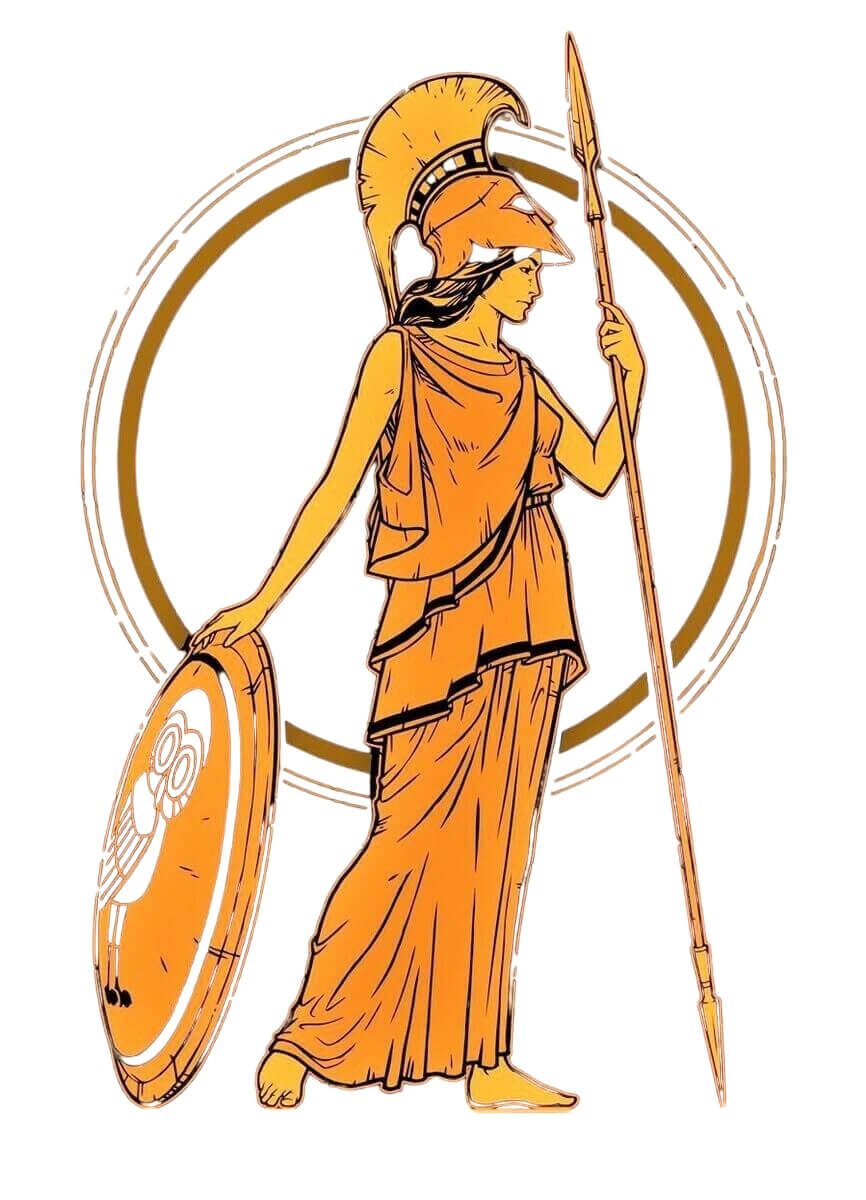Prometheus: Greek Titan God and Revolutionary
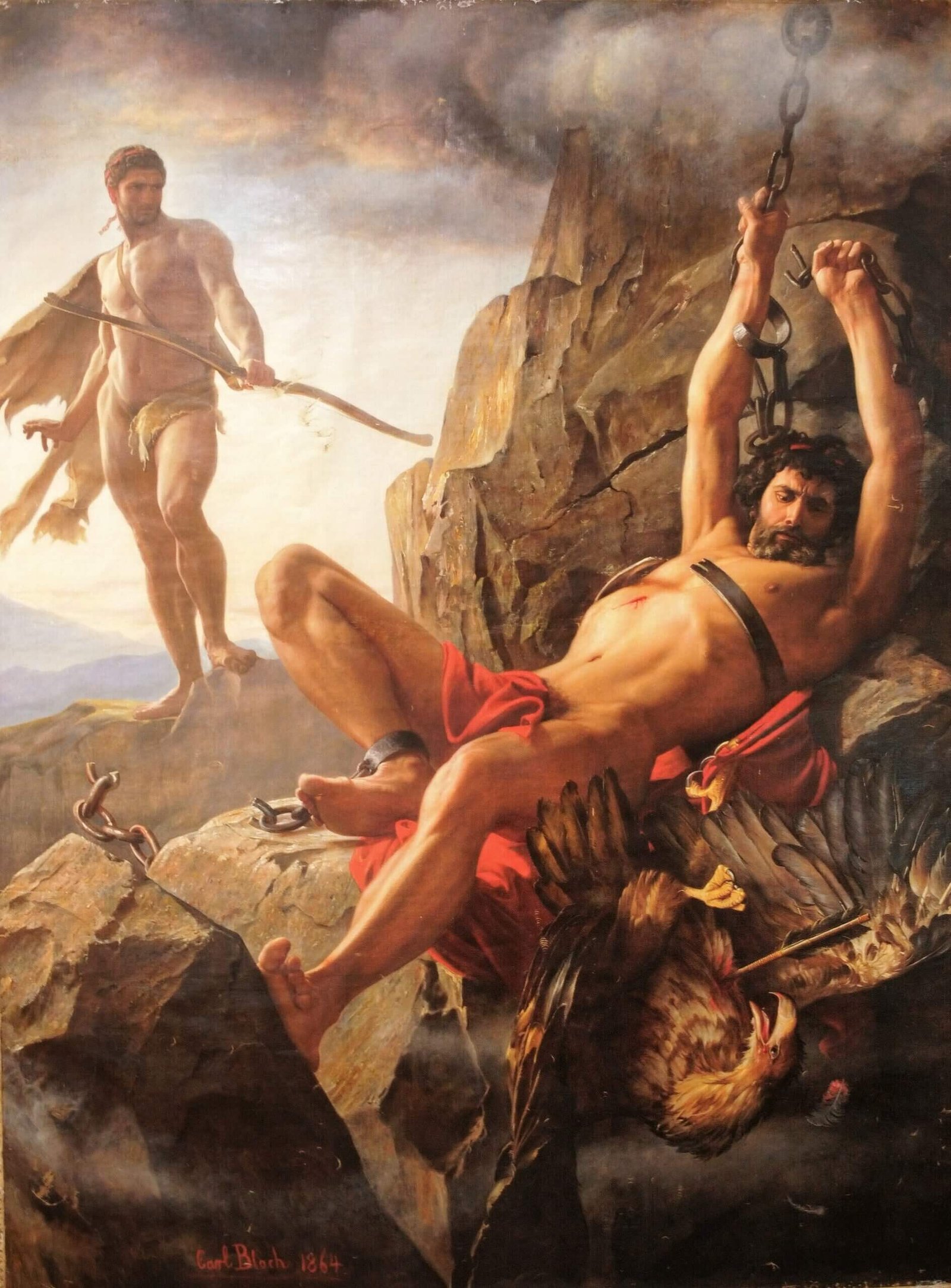
In Greek Mythology Prometheus is the titan-god, that embodied the ideals of revolution and altruism. He stole the fire from Olympus and gave it to people, because of his own kindness and selflessness. Zeus could not forgive such a crime and allow the humankind to live freely, thus he defeated the titan, sending an artificially created woman, to his brother, Epimetheus. Pandora released all the evils and diseases to the world of humans, and Zeus condemned Prometheus to an everlasting insufferable punishment.
The Golden, Silver and Bronze Ages
Having created the world first, the immortal gods created people and made them populate the Earth. The human race felt happy, living in the golden age under the rule of the titan Cronus. Everything grew in abundance and bloom, and there was no need to cultivate fields and gardens. People spent their lives carefree, without knowing diseases and sorrows. The gods themselves often came to visit people: for an advice, or to have fun at a friendly feast. But the golden age ended and its people had died. Thus the gods turned them into good spirits who give good luck and protect justice.
The second generation of people was no longer so happy. The silver age had come. People had less strength and wisdom. The men lived for a hundred years under the rule of their mothers and only a short time as adults, having a bitter strife and discord with each other.
They earned their sustenance by the sweat of their brow, having little joy and knowing much pain. Thus they did not present offerings to immortal gods and did not obey their will. Having dethroned his father Cronus, Zeus had governed the world during the Silver Age. He went into a rage with the inhabitants of Earth because of their impiety and sent them all to the dark kingdom of Hades. Thereupon they dwelled there forever as blessed spirits.
In the third place the people of the Bronze Age had replaced the previous race of humans. They loved the war, above everything else in life and did not know agriculture. They were not eating fruits and bread, only meat. Zeus gave them huge height and indestructible force. Their heart was indomitable and their hands sturdy and muscular. The people of this age made weapons of bronze, in such a way as their houses. Many times they struggled and killed one another in incessant wars they were enjoying as divine ambrosia.
Zeus and Lycaon (king of Arcadia)
Zeus became very angry with the people of the Bronze Age, especially with the impious king Lycaon and his fifty evil sons. Once, he appeared in his country, disguised as a peasant, trying to see if he would be recognized and honored as god. Lycaon not only did not honor Zeus, but also laughed at him and decided to test his all-knowing abilities.
The king and his sons had killed a child and added his entrails into the meal of Zeus. Thereupon the supreme god felt wrath and indignation. He turned the king of Arcadia into a bloodthirsty wolf and killed all his sons with lighting. Only the young Nyctimus had survived, because Gaia saved him by dint of her divine intervention.
The Flood in the Age of Deucalion
Enraged with the people of the Bronze Age, Zeus decided to destroy every single one of them. The human race would have perished forever, but the titan named Prometheus got to know about Zeus’s plans and realized that it would be bad in the world without people. Therefore, he decided to prevent Zeus, alerting his son Deucalion about the upcoming catastrophe. Hence following the advice of Prometheus, Deucalion built a huge wooden chest. He piled supplies into it, and had taken shelter inside it with his wife Pyrrha.
Thereupon the great deluge had begun. It inundated entire cities and villages, sending houses and temples onto the throat of the abyss, devouring the highest mountains and dense forests. The sea had extended all around the surface of the Earth. Swarms of fishes swam along exuberant fields and monuments, meanwhile the dolphins frolicked upon the splendid woodlands of Greece.
Nine days and nights the chest with Deucalion and Pyrrha was carried by the sea waves. When the downpour ceased, it was washed ashore on the top of Mount Parnassus, which towered above the water.
New human race and the Age of heroes

When the water subsided, Deucalion and Pyrrha felt alone and threatened. They asked the oracle of Themis about the repopulation of the earth and were told to throw the bones of their mother behind their shoulders. Deucalion and Pyrra interpreted that “the mother” was Gaia, the personification of the Earth and her bones were the stones. Thereafter they gathered great many of stones and began to launch them behind their shoulders.
From the stones thrown by Deucalion, had emerged the new kind of men, from the Pyrrha’s – the women. This way had appeared the new race of people, whose descendants inhabited the world and had been the contemporaries of great Greek heroes. They acted and lived more pious, noble and just, than the people of the Bronze Age.
Prometheus and people
At first people did not realize how to resist the formidable forces of nature. They didn’t know how to protect themselves from predators and felt afraid of going to sail on the stormy sea. Prometheus decided to come to their aid. He taught them to use metals, recognize the herbs and prepare medicines. He tamed the bull and put a yoke on him. Afterwards he built the first ship, which carried the man to the boundless sea. Prometheus gave many gifts to people and acted very helpful and altruist.
Prometheus deceives Zeus at Mecone
However, Zeus did not want the Greek people to be powerful and independent. He feared that they would dare to stop bringing gifts to the Olympian gods. Therefore, he acted cruel and unjust. Once there was a dispute about which parts of an ox people should sacrifice to the gods and which parts they could keep for themselves. Prometheus was asked to decide.
Thus he cut up the meat of the ox and placed it in two bags. In one – the finest meat, covered with the ox’s entrails and in the other – the bones, hidden under a thick layer of fat. Zeus felt tempted by the fat and chose the second bag. When he realized that Prometheus deceived him, so the humans could sacrifice bones to Olympus, he became very furious. Thereafter he deprived people from the gift of fire. It resulted to be a terrible punishment and many people died of cold.
Prometheus steals the fire from Olympus
Prometheus could not bear human suffering any longer, thus he decided to steal the fire against the will of Zeus. One day he appeared on Olympus, leaning on his traveling staff. No one paid attention to this wand, and in vain: it was empty inside. Prometheus had placed discreetly the coals from the divine hearth into it and took them down to earth.
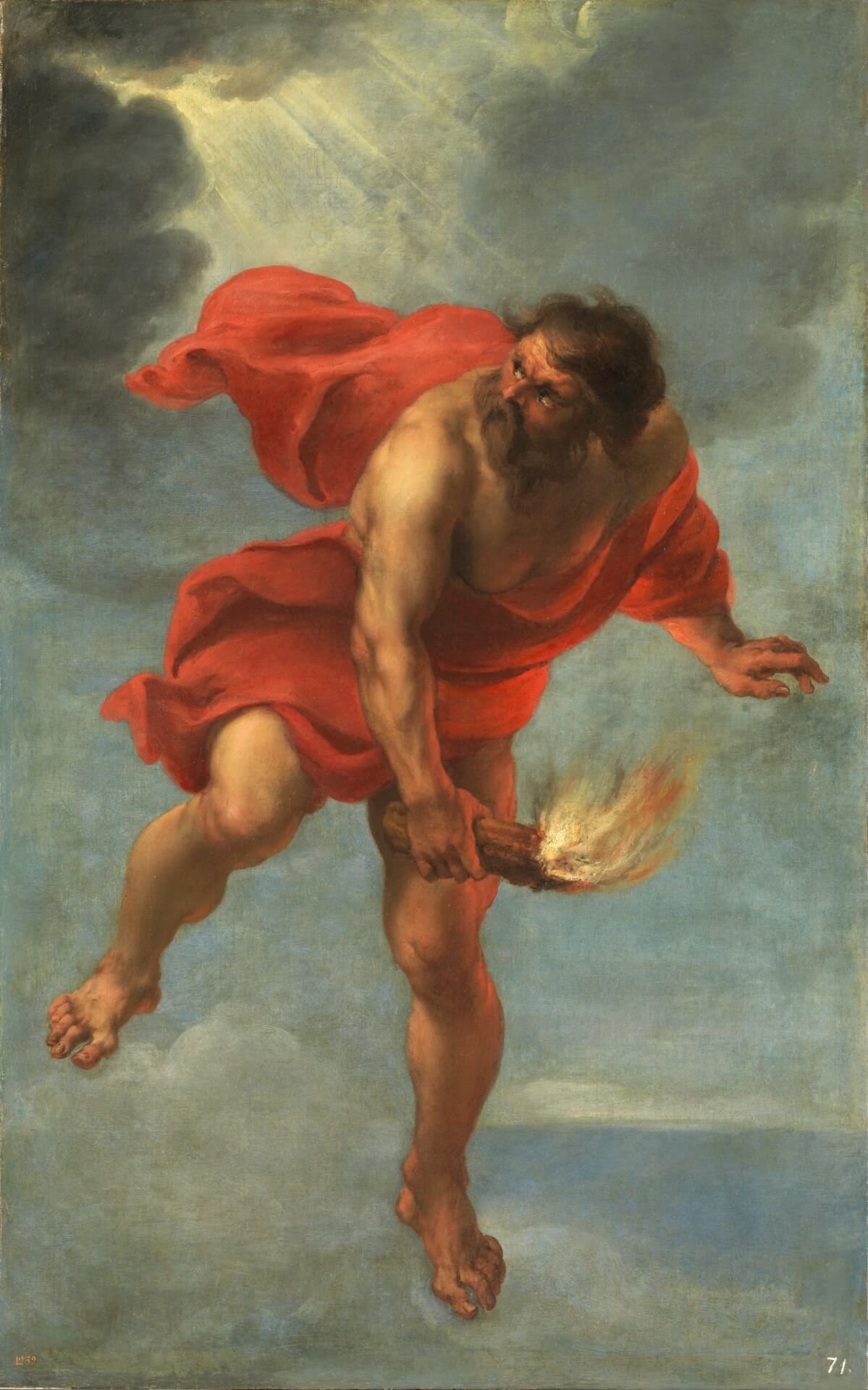
Once again people had fire! They lived no longer afraid of darkness and cold, meanwhile wood crackled merrily in the hearths of their houses. However, when the shepherds lighted their fires in the mountains, Zeus realized that Prometheus outwitted him once again.
Pandora
Nonetheless Zeus was not prone to admit his defeat. In fact, he planned a new calamity for the humans. Therefore, he commanded Hephaestus to create a woman not inferior to the goddesses in her charm and beauty. The god of forge had mixed water with earth and had crafted such a maiden, pretty, attractive and slim. Athena taught her needlework and waving and dressed her in new beautiful clothes. Aphrodite gave her irresistible beauty and charming grace, meanwhile Hermes provided her a cunning mind and the gift of deceitful, crafty speech. The Olympians named the maiden Pandora. That is, “All-endowed”, because each of the Olympians had given her some kind of gift.
Pandora’s Box
The beautiful Pandora was brought to the house of Epimetheus, the simple-minded and trusting brother of Prometheus. The wise titan had strictly forbidden him to accept presents from Zeus and he promised to flatly refuse all the gifts from Olympus. However, when he saw Pandora, he forgot his vows and obeyed the call of his own passion.
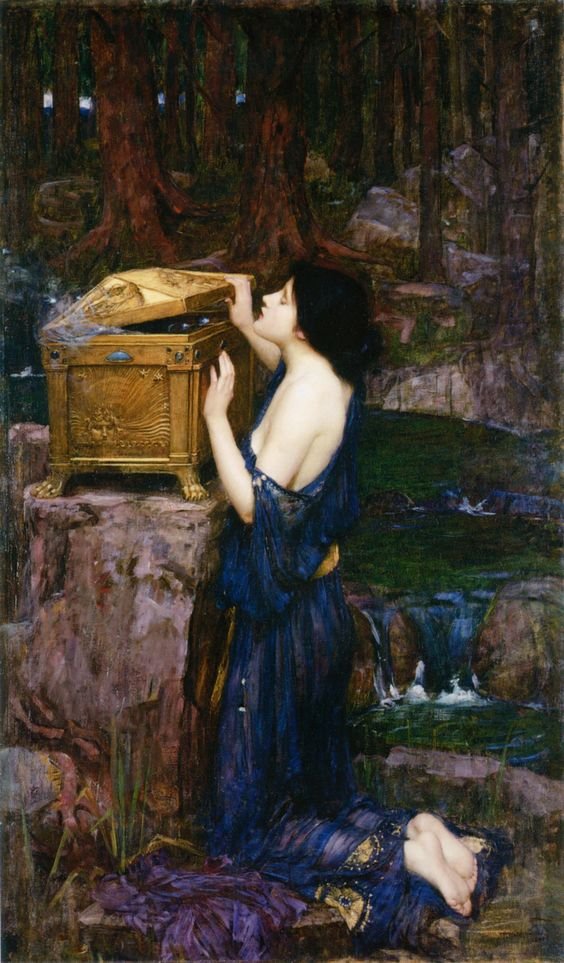
Thereupon, Epimetheus made the beautiful maiden his wife and mistress of the house. Nonetheless one day and because of curiosity, Pandora opened the jar, which she brought with herself from Olympus. For sudden, out of the vessel had flown all the evils and diseases of the world. Worries, unhappiness, sorrows, griefs, illnesses and hunger flew out of it and scattered all over the earth. Prometheus wanted to save people from them, but it did not work. In fact, the curse of Zeus resulted to be too much of malevolent and destructive.
The punishment of Prometheus
Henceforth Epimetheus’ gullibility had a cruel effect on people. They suffered the terrible calamities of the world as they never did before. Even though Zeus could not forgive Prometheus for his attempts to protect humans from their misfortunes and misery. The god decided to punish the stubborn titan with the most fiendish and cruelest torture. Thereupon Prometheus was taken to the edge of the earth and bound to a rock upon a foamed and rumbling sea.
Hephaestus obeyed the order of Zeus and fastened Prometheus in heavy unbreakable chains. As a friend he would like to alleviate Prometheus’ suffering, but he feared the anger of the supreme god.
Prometheus and the Caucasian Eagle
From a high rock, meanwhile being chained, Prometheus had shouted many curses to Zeus. He scorned his cruelty and injustice, suggesting to know a secret, that would destroy the power of the supreme god. In addition to his appalling hardship, Zeus had invented a new type of torture. He sent an evil eagle, that was devouring Prometheus’s liver every single day.
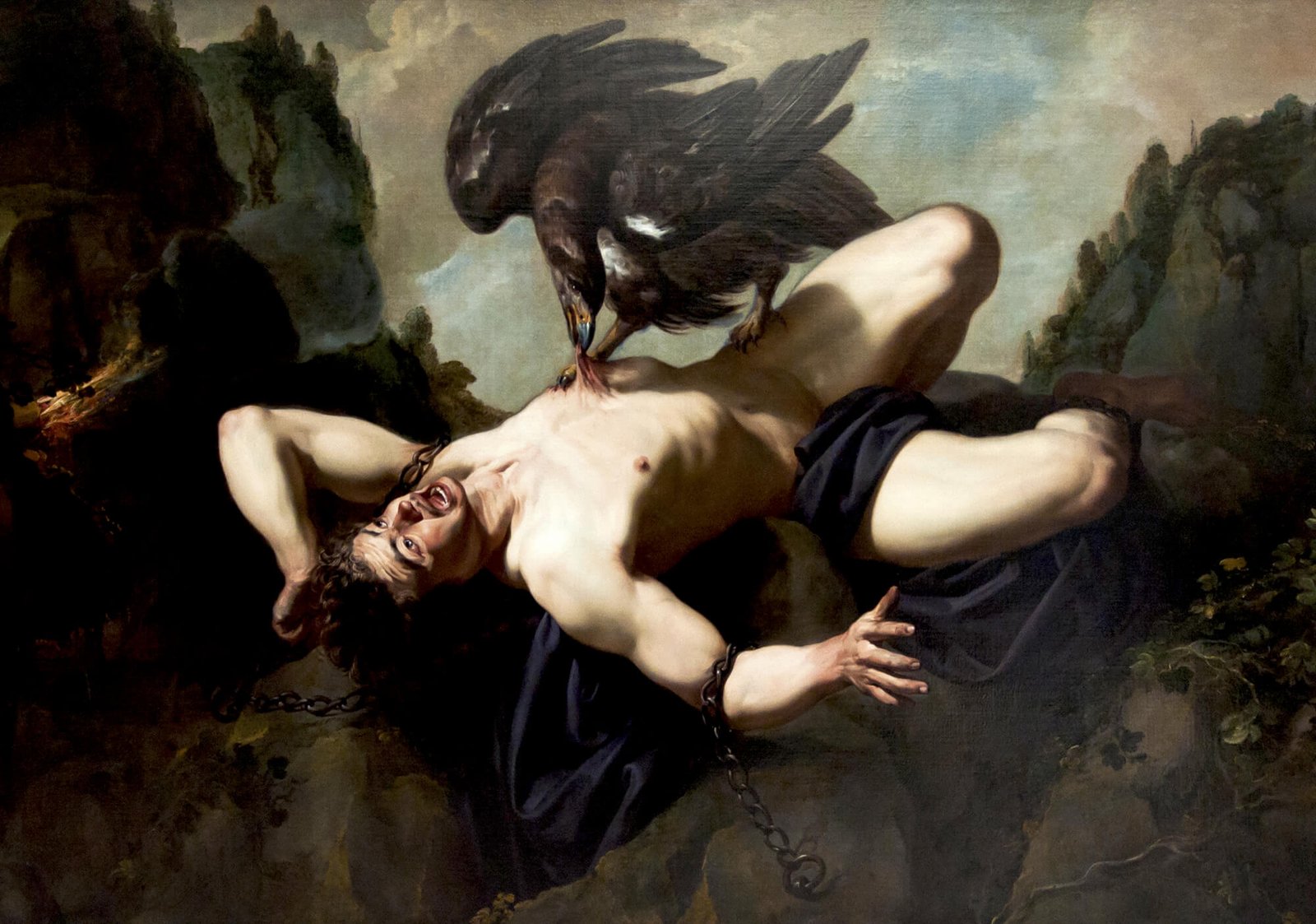
The titan’s liver was growing up until restored during the night and the eagle came back every morning to continue his terrible fest. This way the horrible punishment lasted a long time. Prometheus went crazy of pain and was about to lose his hope forever. However, one day, Heracles passed nearby the mountain, where the good titan stood chained.
With horror and revulsion, he had observed the torment of Prometheus. Hour by hour compassion grew up in his soul. When a fat eagle flew back to prolong his bloody feast, Heracles did not let him approach the titan. He drew his tight bow and launched a deadly arrow. It pierced the eagle and made him fall into the stormy sea at the foot of the cliffs.
As soon as the eagle got killed, Heracles released Prometheus from his weighty chains. Thereafter the mighty titan thanked the son of Zeus and had rejoined the world with pain and rapture.
